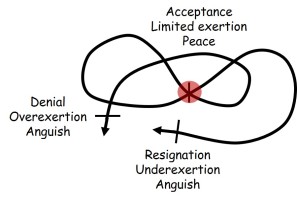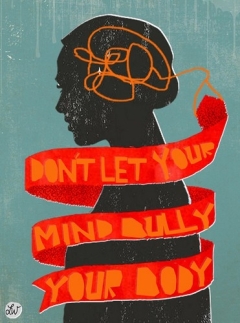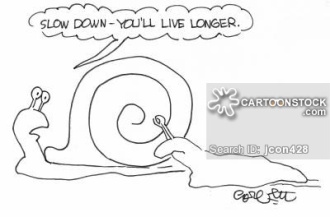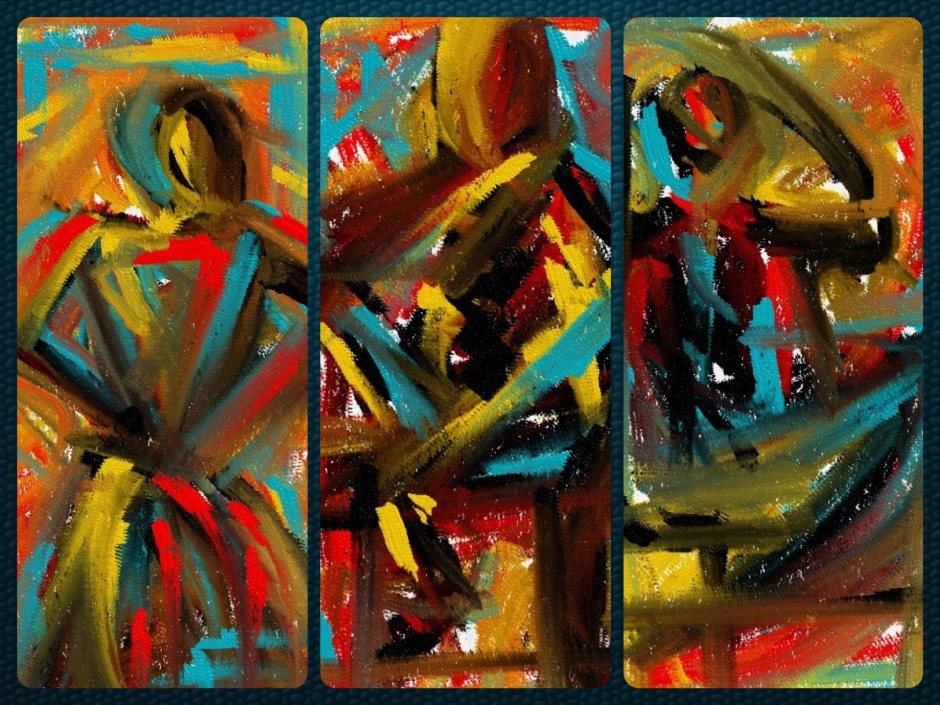I had initially intended my last article to be the final chapter in the Acceptance series of posts. However, recently a friend asked me a very poignant question borne of that post, which prompted this one. It is sort of an extension on my last post on “how to seek acceptance,” in answer to her question:
How do you fight the denial that creeps up even you mentally decide that acceptance in the best way forward?
In my best attempt at a response, I thought I would share my story, with more personal details than the previous one, about how I fought denial while in search of acceptance.

If you’re a frequent reader of this blog, you probably know that I used to be a very ambitious, go-getter type of person. I worked hard, and for the most part, enjoyed working hard because I enjoyed my work! The body was just a vehicle to get me about, nothing that needed any tremendous amount of attention. The idea of “listening to the body” was fairly foreign, it sounded “whiny” to me, like a hypochondriac. And this attitude meant I landed myself in frequent flares because I would ignore my body and what it was trying to say to me.
My avoidance of what the body was trying to tell me was not without reason. I felt like if I were to listen to it, I would never do anything, because I was always tired and achy and never really wanted to do anything at all! Every morning was a struggle just to rise and dress for work (and it kind of is even now). Mind over body, I kept telling myself, however. I just needed to will myself into breaking through the chronic illness mode. But the walls proved harder than I expected. And I almost always lost that battle.

It took me a lot of soul searching to realize that listening to my body is not being beholden solely to its desires.
I was afraid the latter would trap me into the “this is all that is possible” box, and I would not be able to see opportunities outside the box, even if they beckoned at me. I refused to accept all that my body felt or felt possible of it, but I realized that I needed to hear what it said. Then I could evaluate it in my mind, and decide on the best course of action. Mind and body needed to go hand in hand, not fight against each other. The mind still rules, but uses the body’s counsel, as it were.
And that, in a nutshell, is the essence of what “acceptance” has meant for me: Listen to the body; push it but without pushing it over the edge. The mind is still the king, the one who ultimately decides what to do, but one who uses the queen’s (body’s) guidance and counsel. It does not have to always do what the queen wants, but the mind-king must keep the queen-body in the back of his mind so as to not offend her. This idea of acceptance is distinct from “denial,” where the mind rules entirely by itself; and far from “resignation,” where the chronically ill body calls all the shots.
What convinced me to finally embrace this meaning of acceptance (and quit denying my body all of the time) were three pointed realizations, that I arrived at through many months of soul searching and internal dialogues:
1. The first thing I realized is that my old state is not coming back – and certainly not if I keep fighting myself like this!
Educating myself about FM and chronic fatigue helped me the most to come to this realization. Current understanding suggests that these are disorders of central sensitization. A maestro from hell, the brain and nerves in a fibromyalgiac have become so good at shooting off pain signals that they overreact to every perceived stimulus by doing just that. Fatigue and sleep quality are believed to linked to similar pathways, thus making us feel tired all the time (as if just fighting the pain wasn’t tiring enough!). The upshot of learning the science behind the condition was the recognition that fighting my body, and in turn having more pain because of it, is only setting me up for long term failure. The more practice the nervous system gets at sending pain signals, the better it is ever going to get at it by strengthening all those overactive pain-response pathways even more. Therefore, in relieving my body of as many perceived pain signals as possible, like allowing myself to rest as needed, I am really doing myself a favor. Perhaps, in time, it might even allow the brain a chance to “cool off” its pain response a bit.

If you are curious to learn more about central sensitization, check out this video in the blog Sunlight in Winter, whose author does a beautiful job of spreading awareness for the science behind the syndrome in patient-understandable knowledge.
2. The knowledge of the science behind central sensitization made me realize that I needed a truce with my body. And the said truce is my only hope of getting my life back.
It may not be the life I had initially planned, but if I didn’t make some kind of peace with my disorder, I would not have any kind of life at all! Getting this through my thick skull was a huge step towards acceptance for me.
This truce was not giving in to the disease, or resigning away to the illness, but simply making a conscious decision to listen to my body more. Like most things in life, it is of course easier said than done. I have struggled with it off and on, along with my faith that this is the sensible thing to do, and I am still in the process of learning how to listen well.
As a scientist, I am quite used to observing the outside word, our experimental universes. But rarely do we use ourselves as the subjects, while also trying to be the objective observer of ourselves! I have found that it can be quite difficult at first, and really easy to slip up on even after doing it for a while. But what has probably helped me the most to detach and observe myself in as unbiased a way as possible is mindfulness meditation. I have trained myself to keep a piece of me in my head to keep a watch over myself, my thoughts and my body. Sometimes this watchkeeper may bring to my attention my negative train of thought, or at others, remind me to relax my shoulders and fix my posture.

Many of my blog posts emanate from me tapping into this watchkeeper to see what she has observed, and then the posts are the results of my analysis on those observations. She has given me many insights into my thoughts and feelings, especially on the more unpleasant aspects of dealing with a chronic illness. I am not a believer in wishing negative thoughts and feelings away (I know from experience they don’t go anywhere, they just fester under the surface). So I decided to work through them by writing/blogging. Aside from being cathartic, I have also come to greatly appreciate the support of others in the chronic illness community, especially those of us who are also young, and face that additional stigma of “oh-but-you’re-so-young,-how-could-you-possibly-be-sick.” Being around others with similar conditions and associated feelings, and being able to share in their challenges validated my own.
Through my blogging experience, I also realized that being surrounded by accepting people also promotes acceptance in one’s own heart. You see that a chronic illness does not have to be the end of the world, that it is possible to fight it without killing yourself (metaphorically) in the process, and that there can be a life after chronic illness. I think all of these factors played a part in my being able to fight the denial that kept creeping up from time to time.
3. As I slowly came to terms with the idea of acceptance, I realized that not everything about my new life with FM was bad.
It’s just that the benefits in my new life aren’t always the things that are thought very highly of in our fast-paced modern society. For example, I am now a much calmer person, more patient than I used to be. But that permanently changed how my boss views me, because in academia if you’re not a highly ambitious overachiever, you might as well be nothing. But in my personal life, or even my professional life (as a teacher and a mentor), I realize the patience that I have gained has served me well. I feel, overall, more balanced in many ways than before, when I lived a lopsided workaholic world all the time. I have been able to reconnect with my husband, and feel a measure of mental peace that I never knew could be possible.
This recognition, that it’s not been all bad since FM struck, was a major leap forward towards accepting my my chronic condition.

These three major realizations, mostly arrived at through internal deliberations, were my stepping stones to a point where I could stop kidding myself that the chronic illness doesn’t exist, or that I can somehow “wish it away.” Once I had these down, the activities I described in my last post helped me work through my thoughts and feelings (many of the ones I have talked about here), which helped me inch closer every day towards embracing acceptance.
Acceptance of a chronic illness, however, is a very private matter, and can mean something different to each sufferer. So I, by no means, wish to suggest that this is a fool-proof how-to guide that should work for everyone. This is just my story. It is my hope that reading this story might trigger thoughts in someone else in a similar boat, so that they can make their own journey, taking their own private paths, towards their own personal goal of acceptance. In there, lies my satisfaction as a chronic illness blogger.
Gentle hugs,
Fibronacci
MORE IN THE ACCEPTANCE SERIES:
Part I: A Lesson in Perspective and Acceptance
Part II: What is “Acceptance”?
Part III: How Acceptance can lead to Happiness
Part IV (A): Seeking a State of Acceptance
Part IV (B): Fighting the Denial of a Chronic Illness



Re-blogged on “LifeAsaSpoonie” – Thank you 🙂
LikeLiked by 1 person
I am glad this post resonated with you. Thank you sharing it. 🙂
LikeLiked by 1 person
Excellent! I did this, ignored the FM, worked around it, learned to tame it, but then CFS struck and literally wrestled me to the ground. And it’s only after three years of being housebound that I’ve come to learn the peaceful acceptance you’re referring to. These lessons are crucial, I believe, to survival with these illnesses. Maybe if I hadn’t been so hard headed I would have slowed down enough to realize the sirens in my CNS were on red alert, and just maybe this would have never happened to me. I’ll never know and I’ve accepted that and this, I’ve accepted that I’m ill in this season of my life. I so enjoy reading your blog. Hoping your day brings you what you wish for🌸
LikeLiked by 2 people
It must have been really difficult to learn to manage one chronic condition, and then have another one take you down. Try not to blame yourself for “causing” your CFS. I imagine there are many reasons for our nervous systems to go wacky on us, and most of those are probably out of our control! I imagine a very large reason might be our genetics and the environment/lifestyle interactions with the same, that finally decide on our health. So one could do everything “right” and still potentially be struck down with illness if they are genetically predisposed. I find it truly admirable how you have accepted your current condition and are focused on feeling better. We are so intent on pursuing “outwardly” successes, like our careers, etc.. Perhaps it is time we seek an “inwardly” success – our health! 🙂 I am so glad you enjoy reading my blog. Thank you so much for your kind words! Take care, my friend!! ❤
LikeLiked by 2 people
Thank you for sharing your wisdom and compassion. I swear a large portion of the chronic illness community would be the healthiest people on the planet, if they just weren’t sick. Hoping your day is kind!
LikeLiked by 1 person
This is a post I will refer back to!
LikeLiked by 1 person
I am glad that you found the post of value. 🙂 Thank you!
LikeLike
I really loved everything you said in this post, especially the part about “in relieving my body of as many perceived pain signals as possible, like allowing myself to rest as needed, I am really doing myself a favor.”
I completely agree with you. I have heard the message so many times, from friends, from family… even from myself, because it’s just such a culturally ingrained thing… to push myself harder, and, if I rest, to consider first what I am missing out on/not achieving. But rest is not giving up– it is strategic. It is not a last resort when all else has failed– it can be a deliberate tool to stop feeding the nervous system even more pain signals.
And sometimes it isn’t fun– sometimes it requires patience, and restraint, to think ahead and make a calculated choice for our bodies, rather than just plowing ahead and doing exactly what we want.
Thank you for writing this series! I found it really inspiring!
LikeLiked by 1 person
Thank you so much for your kind words! I am so glad this series resonated with you. It echos many of the things you have talked about in your blog, and I have found your educational tools most helpful. I agree about rest being a deliberate, strategic tool. But it has, nonetheless, been hard for me to put away the thoughts of what I am missing out on while not ploughing ahead! I just graduated with a doctoral degree, and have decided to take a little time off before seeking full-time employment, and I am plagued by thoughts of what this break might mean for my future career. So in many ways, I feel like the fight goes on. But being able to intellectualize things definitely helps me choose what I believe is a better, healthier path for myself.
Thank you for reading my blog! I hope you are doing well.
LikeLiked by 1 person
I don’t know that I’m there yet. I re-read my most recent post and it was still mostly about “how can I use this new knowledge that I have a weird diagnosis treated by lots of salt to wring more working hours out of myself.” I’m definitely still in that cheat the system mode where I’m trying to force my nervous system to bow to me with drugs. My nervous system, of course, when put through formal POTS testing and an an annual review at work…responded by literally dropping me on my patootie this morning. This lead to my partner telling me I had to learn to accept my new limits and start working with myself instead of against myself as an ambitious Spoonie. Your post definitely resonates in theory, if not yet in practice.
LikeLiked by 1 person
What you described sounds like a carbon copy of me! Truth be told, I am still trying my best to tame my nervous system with drugs as best as I can. I want to be the best possible version of spoonie-me possible. The trouble before was that I wanted to be the best possible “me”, spoonie or not, and that was not happening even with the drugs. So I am constantly in this bizarre tug-of-war where I slow down some, but also want to keep up with some stuff. It comes down to finding your “steady state” I think. It’s taken me a while to find it – and frankly, it’s too slow for my liking, and every once in a while I worry if I have given in too much to the illness! I can speed up occasionally but not on a regular basis, or I land on my patootie as well. I guess those are the reminders that my limits are set for good reasons. I really hope you start to feel better soon. Take care of yourself! ❤
LikeLiked by 1 person